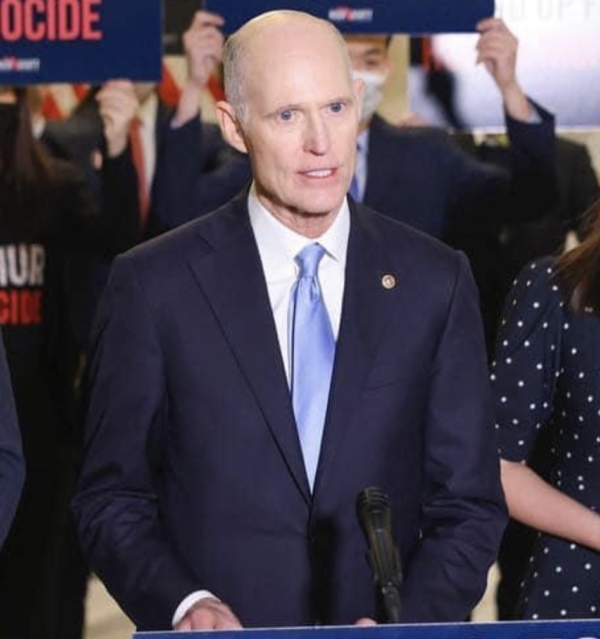
Sen. Rick Scott (R-FL), Wikimedia Commons
Any older voters inclined to put the GOP back in control of the House and Senate in November’s elections might well remember what the Republicans have long wanted to do to their earned benefits. As if to provide that very reminder, Senator Rick Scott, chair of the National Republican Senatorial Committee, released a plan last week that could effectively terminate Social Security and Medicare.
“Scott’s agenda would require Congress to reauthorize every federal law after five years, a step that could imperil Social Security and Medicare should a future Congress choose not to renew the programs.” – Business Insider, 3/4/22
This plan comes from the man responsible for crafting the GOP’s messaging for re-taking the Senate in 2022. But it drew a quick rebuke from Republican Senate leader Mitch McConnell.
“We will not have as part of our agenda a bill that… sunsets Social Security and Medicare after five years. That will not be part of the Republican Senate majority agenda.” – Sen. Mitch McConnell, 3/1/22
While it could be reassuring that Senator McConnell dismissed Scott’s plan so quickly, the GOP has always been fairly good at claiming to support Social Security and Medicare, while offering policies to undermine them. Just before President Trump took office, Rep. Sam Johnson (then the chair of the House Social Security Subcommittee) unveiled a plan that would cut benefits by 30% by raising the retirement age. Later, Republicans from both houses of Congress demanded “entitlement reform” after the Trump/GOP tax cuts added more than $1 trillion to the federal debt. President Trump himself played fast and loose with Social Security, suspending the payroll tax that funds the program despite promising “not to touch” the program.
With the 2022 mid-term elections fast approaching, older voters would be wise to remember that many in the Republican party opposed Social Security and Medicare from the beginning and have never wholly supported either program, despite rhetoric to the contrary. During the past four decades, plenty of Republicans have advocated shrinking federal programs that older and economically vulnerable Americans rely on, while cutting taxes for the wealthy and promoting ‘corporate welfare.’
“Thousands of big American corporations rake in billions each year in government subsidies, bailouts, and tax loopholes—all funded on the taxpayer dime, and all contributing to higher stock prices for the richest 1 percent who own half of the stock market.” – Fmr. U.S. Labor Secretary Robert Reich, 9/18/21
In fact, Senator Scott’s plan for a new GOP majority would actually raise taxes on working people. The Washington Post reports that Scott’s proposal would affect more than 100 million Americans, including “the 32 million who (currently don’t) file returns, such as retirees.”
As if to re-emphasize the GOP’s hostility to programs that help everyday Americans, another prominent Republican Senator, Ron Johnson (WI) said he would like to see his party repeal the Affordable Care Act (ACA) if they win back the majority in November. When they held majorities in both houses during the first two years of the Trump administration, Republicans belied no hesitation to strip away health coverage from some 30 million Americans holding ACA policies. Fortunately, they failed. But only because Sen. John McCain cast the deciding vote against a “skinny repeal” in 2017.

Republicans would have succeeded in stripping health coverage from 30 million Americans in 2017… but for Sen. John McCain’s “No” vote
The Affordable Care Act is important to ‘near seniors’ (aged 55-65), who are not yet eligible for Medicare but tend to require care for chronic and severe conditions. Before the ACA, insurers could charge older patients five times as much in premiums as younger customers. The ACA also enhanced Medicare, including annual wellness visits with no out-of-pocket costs.
Threatening the very existence of Social Security and Medicare – and vowing to repeal the ACA – should show voters who the GOP really are, and what their true agenda is. Many seniors voted in their own interest and migrated over to the Democrats in the 2018 and 2020 elections. Senators Scott and Johnson have just reminded older voters what’s at stake in 2022.


